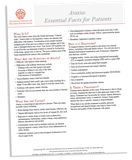Speech/Language Therapy
Role of the Speech/Language Therapist
The speech pathologist has several beneficial roles to fulfill when evaluating and treating a patient with any movement disorder and educating family and professional carers.
The goal of swallowing assessment and intervention is to assure safe and adequate intake, the latter best accomplished with a nutritionist. A thorough swallowing evaluation includes observation of an entire typical meal of foods and liquids in the presence of the speech pathologist. An instrumental swallowing assessment, such as a modified barium swallow study or endoscopic evaluation, may further pinpoint areas of difficulty. The results allow the therapist to determine the best diet consistency and compensatory strategies to assist the patient in completing a meal safely.
View complete description
Speech assessment and intervention are crucial throughout the lifespan. It is always a priority for the patient to be able to hold a conversation and share their feelings, preferences, and ideas to better cope and participate in life. Treatment typically focuses on voice and articulation as these are the modalities most affected. The main goal of speech intervention is to increase the patient's intelligibility, thereby maintaining a good quality of life.
While the standard of practice in North America, cognitive treatment is not part of the role in Europe or Israel, cognitive treatment is offered during the early stage of dementia when the patient is able to learn new information, retain it and adapt to external aides (such as lists, calendars, clocks) which can trigger the desired effect. Equally important is the support, training, and education of the family in dementia management.
Originally contributed by Jeanne Thomson, CCC-SLP and Yael Manor, CCC-SLP; Maintained by the Health Professionals SIG.
Tools
 Patient Handout: Swallowing
Patient Handout: Swallowing
This informational 1-sheet handout is available in 30+ languages.
Active Groups
Speech and Movement Disorders Study Group
The Speech and Movement Disorders Study Group aims to share clinical and research experience across the world in all aspects of communication and swallowing difficulties of patients with movement disorders.
Related Media






